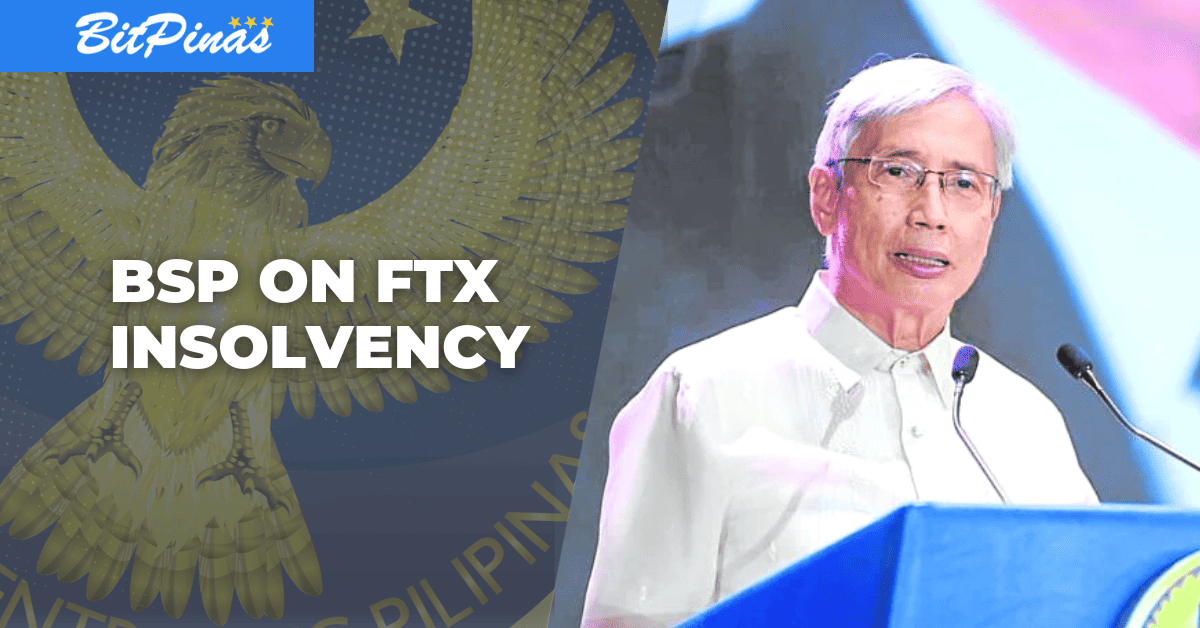Report: BSP Asks Local VASPs of FTX Exposure, Exchanges Respond
The Central Bank confirmed to BitPinas that it checked the situation of the local exchanges to see if they were affected by the FTX’s collapse.

Subscribe to our newsletter!
Editing by Nathaniel Cajuday
In an email response to BitPinas, the Bangko Sentral ng Pilipinas (BSP) has confirmed that it has asked locally licensed cryptocurrency exchanges about their exposure to FTX following the latter’s collapse last November.
BSP on FTX Insolvency
“On the part of the Bangko Sentral ng Pilipinas, we have long recognized that we need to protect crypto clients in the country and the overall financial system. In the wake of the FTX debacle, the BSP has reached out to local virtual asset service providers (VASPs) to detect and monitor possible spillover effects, if any,” the BSP said.
According to the Central Bank, it is closely monitoring the situation and working to ensure that local exchanges have adequate protection against any potential losses.
“BSP-licensed VASPs are required to adopt the necessary controls in key areas such as technology, cybersecurity, anti-money laundering, and consumer protection. At the core of the VASP’s business operations, the central bank is also looking at the corporate governance and risk management systems of these entities,” the country’s monetary authority emphasized.
Exchanges Experienced Downtimes
After the international crypto exchange FTX collapsed due to reports of improper accounting practices and usage of customer funds, the crypto market experienced extreme volatility, especially on November 10, 2022. Locally active exchanges, including Coins.ph, Maya, and PDAX, experienced either downtime or went into maintenance amid the global market meltdown.
No Exposure, Exchanges Clarified

The report that the central bank was monitoring the situation was first revealed by Wei Zhou, the CEO of Coins.ph, in a panel discussion at the Philippine Web3 Festival last November.
In a follow-up statement, Coins.ph clarified that it is indeed not affected by the collapse of FTX:
“We would like to clarify that Coins remains fully operational and our customers are not in any way compromised by the danger of liquidity or credit risk. We do not list the FTT token and we’re not in any way affected by the FTX insolvency,” the exchange explained, also adding they “do not facilitate any leverage trading and we require all trades to be pre-funded, eliminating the risk for our users in case of major market swings.”
Zhou, on Twitter, added that there would be no instances of a bank run in Coins because “it does not lend out like a bank.”
A bank run occurs when many depositors withdraw their money from a bank at the same time due to concerns that the bank may become insolvent.

“Properly run exchange[s], will simply allow users to withdraw their assets, so there should be no such [thing] as a bank run,” Zhou added.
This was echoed by Nichel Gaba, the CEO of PDAX, to BitPinas on the sidelines of the Philippine Web3 Festival. PDAX, he said, does not have exposure to FTX and at the same time, as a licensed exchange, they cannot lend out customer assets as per the BSP rules.
“Under local rules, VASPs aren’t authorized to lend out customer assets, and we are regularly examined by the BSP,” Gaba clarified to BitPinas.
Regulating the Entity, NOT the Blockchain
Incidents like the collapse of FTX highlighted the importance of having comprehensive regulations and strong regulators with a good grasp of the crypto space, the BSP told BitPinas.

“For our Filipino consumers, we have released a number of advisories enjoining them to deal only with BSP-registered VASPs. The BSP regularly examines these VASPs to ensure that they are adhering to the stringent regulatory standards and are ensuring the protection of customer assets and funds,” BSP added.
In a media interview, BSP Governor Felipe Medalla reiterated his stance on cryptocurrency.
“I have already said many times in the past that crypto assets are very risky and those who invest are advised to invest only what they can afford to lose,” Medalla stated.
Maya, the latest entity to receive a VASP license from the BSP, stressed the importance of regulating entities accessing the blockchain to deliver financial services. This is according to Maya Bank President Angelo Madrid:

“First and foremost, we’re not affected, we don’t have exposure to FTX. [What happened in FTX] is not a reflection of blockchain. They issued tokens and created leverage against it. They borrowed against their own tokens.”
As per Madrid’s explanation, it is not the technology itself that needs to be regulated, but the entities that offer services through blockchain.
“Blockchain is a technology that you can access on your own, but at the same time, you trust the person providing that to you. That’s why regulation has to come. You are not regulating the technology; you are regulating the entity that is providing and accessing it to deliver financial services. Those are two different things,” Madrid added.
In a separate statement, Maya advised customers to stay updated on crypto market news and developments to factor in changing supply and demand in their investment approach:
“We also encourage our customers to stay updated on crypto market news and developments so they can factor in the changing supply and demand, which can create volatility and other challenges, in their investment approach.”
This article is published on BitPinas: BSP Asks Local Exchanges of FTX Exposure
Disclaimer: BitPinas articles and its external content are not financial advice. The team serves to deliver independent, unbiased news to provide information for Philippine-crypto and beyond.





